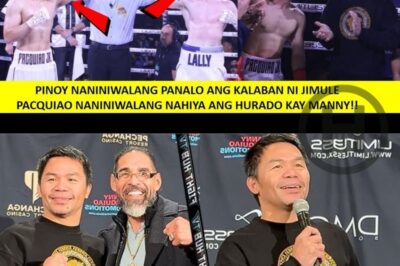“I Will No Longer Be Fooled”: How General Torre’s Statement Sparked a Political Clash With Mayor Baste Duterte
In one of the most widely discussed and politically charged public statements of 2025, General Nicolas Torre III, the current Chief of the Philippine National Police (PNP), made it clear that he had reached his limit. His now-viral words — “Hindi na ako magpapabudol” (I will no longer be fooled) — were interpreted by the public and the media as a thinly veiled message to Davao City Acting Mayor Sebastian “Baste” Duterte.
This line has since become more than just a personal declaration; it symbolizes a broader and more heated battle involving the PNP, the Duterte political stronghold, and long-standing questions about impunity, accountability, and power dynamics in the Philippines.
🌐 The Background: Arrests, Reshuffles, and Duterte Pushback
The friction between General Torre and Mayor Baste didn’t erupt overnight. It was a product of multiple overlapping developments that exposed deep-seated issues between law enforcement and political dynasties.
Torre first drew national attention for leading major operations — including high-profile arrests of individuals linked to powerful religious and political circles. One of the most notable cases was the crackdown on Apollo Quiboloy’s compound following allegations of human trafficking and abuse. This, along with the arrest of former President Rodrigo Duterte under an ICC warrant, placed Torre at the center of a political storm.
These actions, while applauded by some, triggered outrage from certain sectors in Mindanao — especially in Davao, where the Dutertes maintain deep-rooted influence.
Mayor Baste Duterte openly accused Torre of politicizing police work, reshuffling key officers in Davao, and engaging in what he viewed as moves designed to damage the Duterte family’s public standing. His public reactions included bold rhetoric, even threats of physical confrontation.
🔥 The Statement: “Hindi na ako magpapabudol”
Amid the intensifying situation, General Torre’s defiant line — “Hindi na ako magpapabudol” — was perceived not just as a personal warning but also as a broader rejection of political pressure. It was a refusal to be manipulated or undermined by local power players, no matter how prominent.
In the Philippine context, “magpabudol” can imply falling for someone’s charms, deceit, or coercion. Torre’s usage of the phrase was deliberate. By drawing a line in the sand, he effectively challenged the status quo of provincial political dominance over law enforcement activities.
👥 Public Support and the Rise of the “Torre Doctrine”
Shortly after Torre’s statement gained traction, many Filipinos on social media platforms rallied behind him. Reddit threads praised him for his composure, calling him “the most fearless PNP Chief in recent memory.” Others labeled his stance as the emergence of a “Torre Doctrine” — where law enforcement no longer bows to political dynasties.
Even the Philippine National Police Academy (PNPA) alumni issued an informal statement showing solidarity with Torre, stating that the force must remain independent and that its leaders should not tolerate intimidation from any local officials, regardless of their family name.
In an age when many have grown cynical about police accountability, Torre’s straightforwardness struck a chord. He was described as “unshakable,” “resolute,” and “a rare breed of officer who plays by principle, not politics.”
🥊 Tensions with Mayor Baste: From Words to Near Confrontation
Mayor Baste Duterte’s reactions have been, by contrast, emotionally charged and media-centered. At one point, he was quoted as saying that he would slap General Torre if they ever met in person — a threat that only increased the visibility and stakes of the feud.
In response, Torre issued calm but pointed rebuttals. Rather than escalate emotionally, he emphasized discipline, law, and proper channels. “If there are accusations, file a case. If there are doubts, provide evidence,” Torre said in an earlier briefing.
While no physical confrontation occurred, some supporters on both sides jokingly floated the idea of a boxing match — symbolizing not just personal conflict, but an institutional face-off between old-guard politics and reformist law enforcement.
⚖️ Institutional Repercussions
As the situation evolved, analysts began to warn of wider implications:
-
Erosion of Civil-Police Relations: If local governments like Davao begin resisting national police authority, it could set a dangerous precedent.
Threats to Police Independence: If Torre is removed or pressured due to political displeasure, it would signal that national officers must still operate under the shadow of local political influence.
Accountability Disruption: The Davao City Police reshuffle, though framed by Baste as politically motivated, was a legal administrative action. If such routine operations become grounds for political retaliation, police governance may falter.
🧭 Contrasting Leadership Styles
General Torre:
Methodical and tactical
Prefers procedure over public spectacle
Quiet but firm communicator
Promotes transparency without self-promotion
Mayor Baste:
Vocal and emotionally reactive
Speaks through charisma and family legacy
Deep ties with religious and political networks
Uses public opinion to frame conflicts
This contrast makes the feud especially symbolic. Torre represents institutional reform and law-based authority. Baste, meanwhile, is seen as a figure defending regional pride, familial influence, and legacy politics.
🤖 Social Media’s Role: Torre’s Popularity Surges
Though not known for his online presence, Torre’s restraint and clarity have made him a social media icon. Dozens of memes, fan edits, and tribute videos now circulate online, often painting him as a no-nonsense officer in a sea of political compromise.
One viral post compared Torre’s photo to that of a movie hero: silent, watchful, and ready to act. The caption read: “Not all heroes wear barongs — some wear bulletproof vests.”
Meanwhile, Baste’s memes leaned toward mockery, with users highlighting his volatile language and questioning his maturity in handling leadership conflicts.
🔮 What Happens Next?
The Torre vs. Baste showdown is far from over. The national government has, so far, remained largely silent. But the longer the issue lingers, the harder it will be to ignore.
Key questions ahead include:
Will Torre initiate further administrative changes in Davao?
Will the Duterte family mount a formal complaint or political campaign to challenge Torre’s authority?
Will President Marcos Jr. step in to de-escalate or take sides?
For now, the ball remains in Torre’s court — and judging by his track record, he’s unlikely to yield.
🧾 Key Summary Table
Element
Detail
Who Said It?
PNP Chief Nicolas Torre III
What Was Said?
“Hindi na ako magpapabudol” — “I will no longer be fooled”
Target of the Message
Widely interpreted as directed toward Mayor Baste Duterte
Core Conflict
Clash over police reshuffling and perceived attacks on Davao leadership
Public Reaction
Strong support for Torre, especially from PNP alumni and netizens
Institutional Impact
Raises questions on PNP autonomy, local interference, and discipline
Current Status
Verbal feud ongoing, no physical confrontation or formal legal case
📚 Further Reading (No links appear in the main content)
Editorial: “Torre vs Baste: Clash of Authority and Emotion” – Philippine Star
PNPA Alumni Respond to Torre’s Statement – Police Files Tonite
Baste Duterte’s Reaction to PNP Changes in Davao – Manila Bulletin
Timeline of Torre’s Arrests and Police Operations – Inquirer Philippines
Analysis: What Torre’s Leadership Means for the PNP – Rappler
News
Gerald Anderson Sets the Record Straight: Denies Rekindling Romance with Julia Barretto Amid Social Media Rumors (NH)
Gerald Anderson Sets the Record Straight: Denies Rekindling Romance with Julia Barretto Amid Social Media Rumors December 2, 2025…
Sibling Showdown: Eman Bacosa Faces Jimuel Pacquiao in an Epic Boxing Clash (NH)
Sibling Showdown: Eman Bacosa Faces Jimuel Pacquiao in an Epic Boxing Clash December 2, 2025 Introduction In the world of…
Jimuel Pacquiao Expected to Struggle Against Opponent, Says Disappointed Judge: Manny Pacquiao Feels Embarrassed (NH)
“Jimuel Pacquiao Expected to Struggle Against Opponent, Says Disappointed Judge: Manny Pacquiao Feels Embarrassed” December 1, 2025 Introduction The boxing…
Jinkee Pacquiao Drops Spicy Comment on Jillian Ward and Emman Bacosa Relationship: Social Media Ablaze (NH)
“Jinkee Pacquiao Drops Spicy Comment on Jillian Ward and Emman Bacosa Relationship: Social Media Ablaze” December 1, 2025 Introduction…
Netizen Regrets Handing Over Yu Menglong’s Clearest CCTV Footage to His Agency: Public Debate Erupts Online (NH)
“Netizen Regrets Handing Over Yu Menglong’s Clearest CCTV Footage to His Agency: Public Debate Erupts Online” December 1, 2025…
Sylvia Sanchez Nearly Melts with Joy at Zanjoe Marudo’s Heartwarming Gesture for Sabino’s Child (NH)
“Sylvia Sanchez Nearly Melts with Joy at Zanjoe Marudo’s Heartwarming Gesture for Sabino’s Child” December 1, 2025 Introduction In…
End of content
No more pages to load












